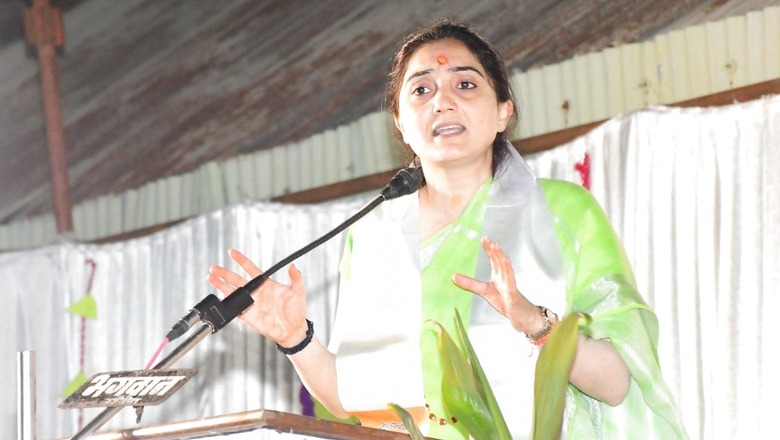
views
The reaction of some Islamic countries to the remarks made in a heated TV debate on Islam has been politically excessive, even if one recognises that such comments should not be made and that it is wrong to hurt the religious sentiments of any community. The sensitivities of Muslims are particularly strong when it comes to their religion and can lead to physical violence, as the world knows from experience.
We have almost 200 million Muslims in India, and over the years we have built close political and economic ties with key Islamic countries. For communal harmony at home and abroad, and to nurture relations with Islamic countries, India needs some caution when engaging in debates at home on historical wounds inflicted on Hindu sentiments by desecration of temples in India by Muslim invaders and rulers and building mosques on the most sacred Hindu sites in northern India.
Whether the pages of history should be finally turned or past wrongdoings can be righted is an ongoing internal debate in which if some Hindu groups seek redress, the Muslims are not willing to yield. The issue has a constitutional dimension with the judiciary involved. This is part of the democratic churn in India caused by shifts in political power.
With the creation of Pakistan, a part of historical India has been lost to Islam. It is a wound that continues to fester in India with Pakistan’s Islamic hostility and its resort since decades to jihadi terrorism against us. In Jammu and Kashmir, local Muslim elements have been complicit with Pakistan to sow terrorism, perpetrate ethnic cleansing of Hindus in the Valley and spread the canker of Islamic fundamentalism in an Indian state.
For a long time, Pakistan has played the religious card against us in the Islamic world with some success with conservative Gulf kingdoms in particular. This card, however, has ceased to be effective with palpable improvement in ties between India and these countries, which now see themselves as vulnerable to Islamist extremism after the emergence of the ideology of the Islamic State, as also the perceived threat from the Muslim Brotherhood to their monarchical systems.
The Organization of Islamic Corporation (OIC) has ceaselessly attacked us on the Kashmir issue at Pakistan’s behest, discarding any objectivity or any sensitivity about how this affects relations of the Islamic world with India. Turkey has become increasingly Islamist in nature and has joined hands with Pakistan on supporting their “Muslim brothers and sisters” in Kashmir. It has become active for some years in the OIC in targeting India. India has been reacting very sharply to the OIC’s interference in the J&K issue. This affects public sentiments in India towards the Islamic world in general even as our relations with it flourish in many ways.
All these political realities have an impact on community relations in India. Pan-Islamism as a political and religious phenomenon has an adverse impact on inter-religious harmony as it feeds suspicion that sections of the Muslims in India are linked to, are encouraged and feel emboldened by external support to adopt aggressive postures on issues of minority rights in India over and beyond the avenues available to them within India’s constitutional and legal system to seek redress.
Just as some opposition leaders and the so-called Lutyens lobby look to the US in particular to apply pressure on the ruling party and the government on issues such as minority and citizen rights, suppression of freedoms, Hindutva ideology, and so on, elements in the Muslim community look to the Islamic world for support to combat perceived anti-minority trends in India.
Added to all this is the growing Hinduphobia in the US and the UK in particular, in which “secular” lobbies in India are complicit. Conferences have taken place in US universities ostensibly denouncing Hindutva, the rise of “Hindu nationalism”, the RSS, with American experts disparaging deities and hurting the religious sentiments of Hindus under the cover of scholastic studies. This has led to official Indian concerns about the impact of this campaign on the security of Hindus abroad. This explains why India wants the UN to broaden its agenda of decrying not only Islamophobia but phobia against all religions.
India has all the more reason to be aggrieved about Hinduphobia trends in the Anglo-Saxon world as Hindus are not involved in terrorism, beheadings, suicide bombings, preaching violence based on religious texts or carrying on extremist activities through international networks.
The controversy that has arisen in India has a complex context overlooked by those Islamic countries, which have chosen to attack India publicly. Qatar has led the charge, which is not surprising because of its links with the Muslim Brotherhood, political and tribal rivalries with Saudi Arabia and the UAE for leadership of Islamic causes by galvanising the Arab street in which its Al Jazeera news network plays a powerful role.
Flushed with huge wealth derived from its gas exports (it is India’s biggest supplier of LNG), the ambitions of the Qatari royal family are expansive. Qatar hosted the US-Taliban dialogue and maintains close ties with the Taliban leadership. On one level, this has served the Americans while, at another level, it shows the links it has with extremist Islamic organisations that use terrorism as a road to acquire political power. Qatar also has links with the Hamas in the Gaza Strip, as well as with Turkey on the Muslim Brotherhood network to which President Erdogan belongs who, as mentioned, has become problematic for India with his strong Islam oriented support for Pakistan .
Qatar went too far in summoning India’s ambassador for lodging a protest and seeking an apology from the Indian government, with a Qatari foreign ministry official even castigating the government as “extremist”. Qatar is also hypocritical about the depth of its commitment to Islam in choosing to adopt a soft “neutral” position on China’s treatment of Uighurs to keep open illusory possibilities of mediation.
Having triggered the protest, many Islamic countries including Saudi Arabia, UAE, Iran, Turkey, and most surprisingly, Maldives and Indonesia have followed Qatar in summoning India’s ambassadors or issuing statements. While one can understand that the Saudi and UAE protests are part of competitive Arab politics, that of Maldives and Indonesia (which also summoned the Indian ambassador) are less understandable, and some lessons need to be learned from this.
The Iranian foreign minister’s visit to India on the heels of this episode and his apparent satisfaction with the steps taken by the government is helpful in calming matters, even though some may say that we are not looking to satisfy the Iranians or anybody else, given the nature of their own repressive and intolerant regimes. While that can be a popular view , the government has to weigh its position more carefully.
Summoning the ambassador raises issues to the state level, which was uncalled for. The two individuals, who are accused of insulting Islam, have been described by some protesting countries as “officials”, which they are not. They are not spokespersons of the government. None of them is attached to the Prime Minister’s office or any government ministry. The BJP does not have a single spokesperson for the party. In 2021, the BJP had 25 national spokespersons, who appear on TV debates on several issues. They are adjuncts to the party, not its core.
Protesting governments should have done proper homework on the totality of the circumstances that led to remarks that have been seen as offensive. During TV debates, political speeches and on social media, many offensive remarks have been made by Indian Muslim citizens against Hindus and their sacred religious symbols, including the purported desecration of the Shivling in the Gyanvapi mosque which is under the court scrutiny. On national TV and in some mosques, representatives of the Muslim community and clerics have either called for beheading the offending individuals or view beheading as condign punishment, even when this is impermissible under Indian law. This is unacceptable.
The government has sought to control the fallout of the incident in order to maintain communal harmony in India as well as cushion its relationship with Islamic countries. The subject is indeed very sensitive and can be exploited by vested interests in India and abroad to create more tensions. One of the two individuals has been suspended and the other expelled from the BJP, causing criticism in some circles in India for succumbing to protests by some autocratic Islamic countries, which themselves have a little respect for human rights.
The point is not that. The government has to take into account the totality of considerations for a pragmatic response. It is a pity though that opposition circles in India have tried to score points against the government and embarrass it, whereas they should have shown solidarity on the external front while legitimately calling for communal harmony at home.
Kanwal Sibal is former Indian Foreign Secretary. He was India’s Ambassador to Turkey, Egypt, France and Russia. The views expressed in this article are those of the author and do not represent the stand of this publication.
Read all the Latest News , Breaking News , watch Top Videos and Live TV here.















Comments
0 comment